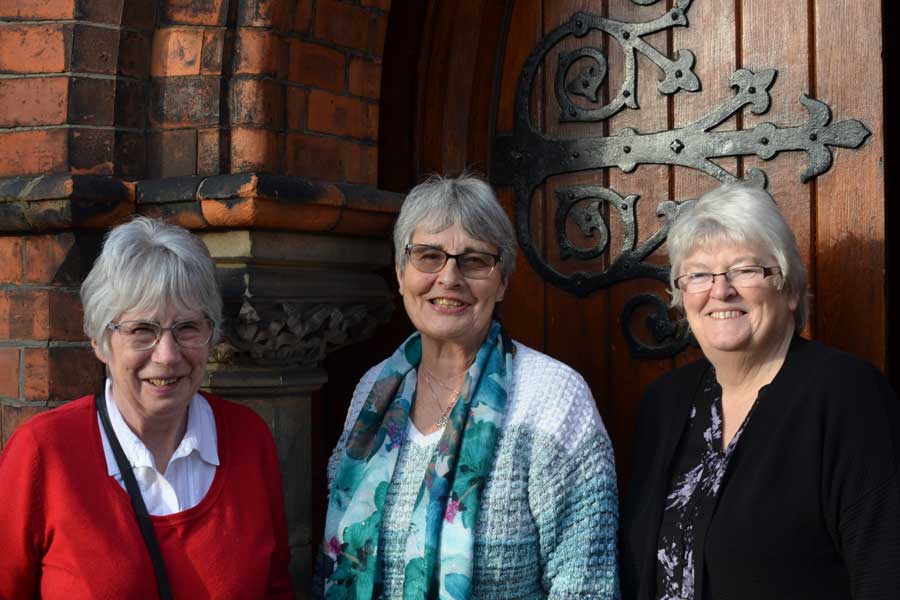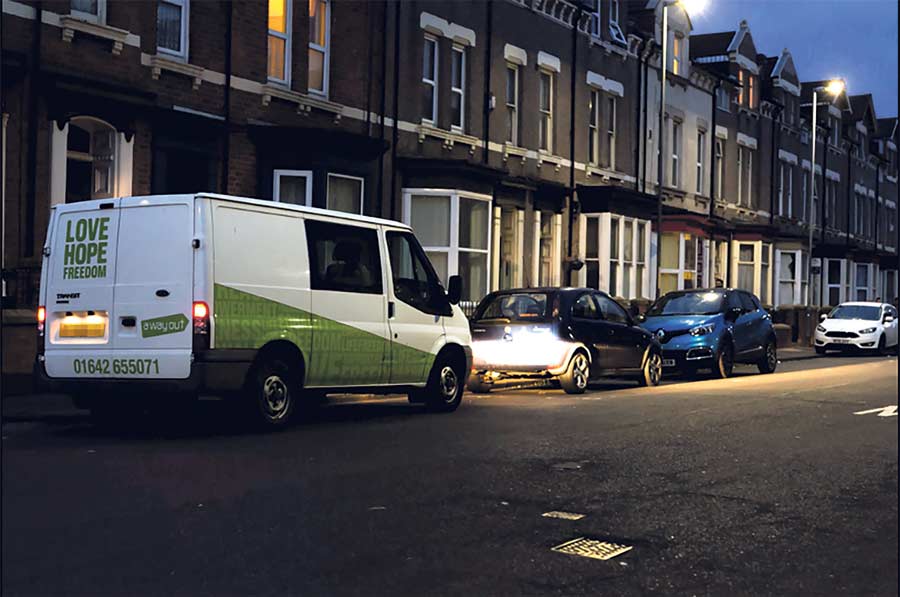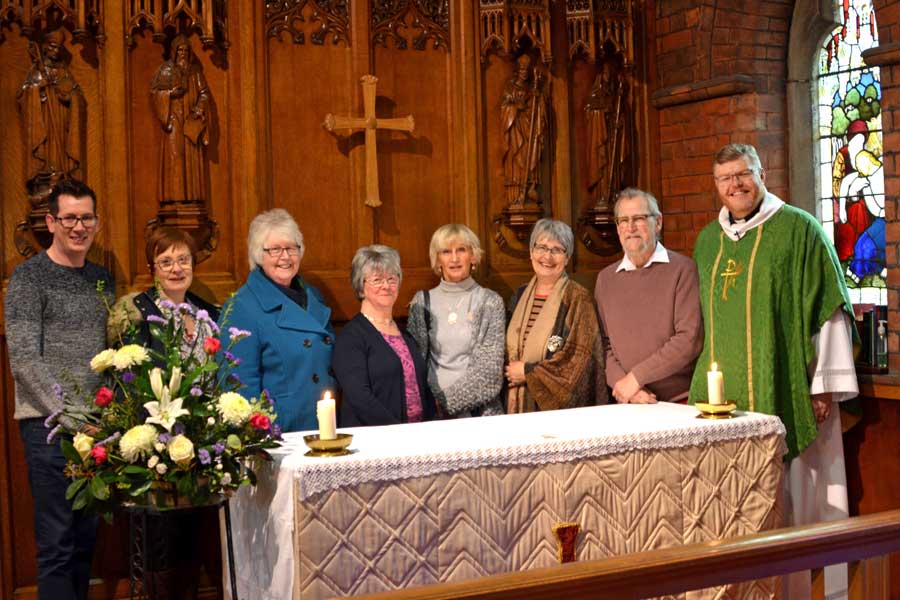Beyond the four walls
What’s a church to do when they find sex workers on their doorstep?
Smack bang in the middle of an area of Stockton-on-Tees known for prostitution and drug dealing is a church. A traditional Anglo-Catholic church, they used to be content to keep themselves and God within their four walls. Now, they are actively involved in the community. This is their story.
By Camilla Lloyd
A couple of years ago, their diocesan development officer nominated them for Partnership for Missional Church (PMC), Church Mission Society’s three-year layled programme which encourages churches to explore what God is doing in the local community and how they can be a part of it.
At the time, the small church of 70–80 members had a thriving choir and ran Messy Church and Toddler Praise in order to attract young families. But at the same time, the church was fairly static, almost lethargic, with an ageing congregation. Ruth Hicks, leader of the PMC steering group, says, “We were very satisfied with ourselves. We used to come on a Sunday for ourselves, for the congregation.”

Initial surprises
One of the first things the PMC process led them to do was a community assessment, which yielded some surprising results. For one thing, their neighbourhood wasn’t full of elderly people as they had assumed: most residents were aged 20–35, which came as a great surprise. The team also came across research by the University of Durham stating that the average life expectancy for a town centre resident is a whopping 18 years lower than that of a resident on the outskirts.
A discrepancy likely due to the high incidence of generational cycles of poverty, addictions, poor diet, etc. in the town centre. While some churches need to spend time looking for where they can be of use, for St Peter’s, local needs were staring them in the face.
Street workers were dropping in to the church, asking for money or help. The church was approached by police – they’d had complaints of goings-on in the church grounds, and perhaps the church could install more lighting as a deterrent? The vicar, who lived a five to ten-minute walk away, was propositioned almost every time he walked to church.
A leap into the unknown

When a particularly demanding girl came to the church one day and wouldn’t leave, Ruth rang local charity A Way Out. Anita Burke, general manager of the charity, says, “That was a phone call that I often recount. And I probably will never forget.”
On the phone, Ruth explained that the church was right in the centre of the patch where the girls work, and that the girls kept propositioning the vicar. Anita listened, and waited for Ruth to berate her or ask her to move the girls on. To Anita’s surprise, Ruth asked how the church could support these women, welcome them and help them. The rest, as they say, is history.
A Way Out embraced the offer from St Peter’s and took time to equip these new volunteers by putting together and delivering a comprehensive, rigorous training package. It was during this phase of waiting and preparing to work with street workers that the current vicar of St Peter’s, Bill Braviner, took up his post.
Passionate about going to people on the margins, like Jesus did, Bill was excited and surprised by their plans. “I haven’t really come across a church before who said, ‘We’ve realised there’s a need here and we want to do something.’ They felt challenged by God to leap out of their comfort zone.”
Getting started
By now, St Peter’s was almost ready to put a plan into action. Having chosen a ministry they were excited about, found volunteers easily and organised training, the PMC group took a proposal to the parish council. Their proposal outlined a six-month pilot in partnership with A Way Out, inviting girls into the church once a fortnight, offering hot drinks and food.
The council passed their proposal unanimously. “I was shocked rigid,” Ruth says. “That was a huge change. For the congregation, and especially for that council, and they’ve been supportive ever since.”
They went ahead with their pilot, but it wasn’t a great success. Once a fortnight wasn’t often enough to build relationships and the early evening timeslot wasn’t convenient. Additionally, the chaotic schedule that often accompanies street work made it too easy for girls to turn up on the wrong day. Another barrier was that some of the girls couldn’t get past the fact that it was happening in a church. Whether they had faith or not, the street workers felt condemned and judged and gradually stopped coming. After a few months, St Peter’s exciting new offer needed to be reviewed.
After so many green lights, including from the church council, what had gone wrong?
“Send us out, Lord”

At the end of every Sunday service, the congregation were praying to be sent out, but in practice, they were asking people to come to them. If their pilot was anything to go by, this method wasn’t working. A Way Out’s other staff and volunteers, however, had the opposite approach, and were actually doing what members of St Peter’s were praying for every Sunday. The charity’s tried, tested and trusted method of engaging with the girls involves going out and meeting the girls on their own turf. “We know it works,” Anita says.
At this point, the only thing that made sense was for St Peter’s to abandon their idea of inviting girls into the church, and join in with what A Way Out were already doing. Now, a team of volunteers, which includes nine people from St Peter’s, takes turns going out in the van from 8–10 at night, three times a week. They don’t have to go far – driving in circles around the church, they always meet girls who are out working. How many girls they talk to in a given evening varies; sometimes it’s two or three, another time they spoke to 11.
“When we go out in the van, we might be the only people that day who have looked them in the eye and smiled. And asked them if they’re all right. They’re either invisible or they’re scorned,” says Sandra Hawkswell, volunteer with A Way Out.
Understandably, A Way Out require all volunteers be female. For Bill, it’s the first time in 24 years of being a vicar that he can’t participate in a significant project going on in his church. Happily, though, the team is so capable he has no qualms about supporting from a distance.

Baby steps
Local street workers are generally comfortable talking to the ladies in the van – those who haven’t met them before hear from others that they are safe. But getting beyond a chat can be more difficult. For many of these girls, their life experiences have completely disintegrated their ability to trust, meaning the volunteers may spend a long time building trust through hot drinks and sandwiches before the girls feel they can accept anything more.
As the volunteers get to know girls better and they disclose that they are sex workers, the volunteers’ attitude is acceptance and a desire to help them to do what they do safely. “We offer a needle exchange, condoms, toiletries, and once they trust us, we invite them into our centre to a drop-in where they can access hot food, a wellness session and a one-to-one assessment where we start digging down into why they’re on the street,” Anita says.
Whether they are working to fund their own or a partner’s substance habit, or to pay the rent and put food on the table, none of the women are there by choice. Each one of them is trapped, unable to find a way out on her own.
Anita tells of one girl who said, “I was stood on this corner and I was crying out to God, and saying, just give me a sign that you’re there, because I am desperate, and I’m having to sell myself.” As she was thinking that, the A Way Out van came down the road. When the ladies saw her, they did a U-turn and stopped alongside her. Testimonies like this inspire volunteers and the charity to keep going, even though tangible results take time.
“Just making themselves vulnerable to open up to receive love in a different way for me is a step towards Christ, towards the arms of Jesus, because they’re actually realising what real love is,” says Anita.
From first encounter to fresh start
The journey from meeting a girl for the first time to seeing her start over in a new location is a long one. For most of the girls the team meet, their behaviour and emotional trauma is highly entrenched, and sex work is generally part of a much bigger and more complicated picture of interconnected issues. It can take five, seven or 10 years from meeting a girl on the street to the point where she’s living independently. Rather than steady progress, it’s a long process of continual ups and downs.
Girls who have gone on to start a new life with the help of the charity have generally done so in a new location, meaning the charity often doesn’t see girls come all the way through to a living faith. But they have sown the seed; girls know that the organisation is based on Christian principles, and they meet Jesus through people like Anita and the many volunteers who are Christians.
In addition to their partnership with A Way Out, members of St Peter’s Stockton help at local primary schools, provide emergency accommodation for homeless people and support families in crisis. They also put their church building to good use, hosting Toddler Praise, Messy Church, Cafe Church, as well as a weekly English class for asylum seekers and refugees, with 130+ registered, and 40 people attending regularly from 24 countries. They will soon be running a children’s lunch club during the school holidays as well.
From ordinary to buzzing
People in Stockton-on-Tees say St Peter’s is very different now compared with three or five years ago, but how did this church go from static and inward-facing to active and engaged in the community? According to them, it’s very clear what’s made the difference: prayer and PMC. It all kicked off when they started praying together every week, and prayer is still very much at the heart of everything they do. PMC helped the congregation to know the community better and be more intentional about mission. Now, they’re looking, listening and engaging with the real issues, making church more real to people on the outside, and their congregation has almost doubled in size, to nearer 150 communicants.
According to Bill, “PMC has transformed St Peter’s both in terms of what it does and in terms of its self-understanding as a church. It’s turned the focus outwards, which is a great thing.”